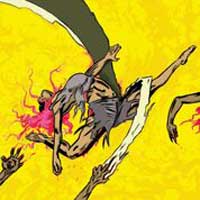
 [rating=3]Do you remember when you were thirteen? It’s not something I’ve been asked to think about much, so it took some time to recall that time in my life, but once I dove in the flood gates opened and a tidal storm came rushing back. When I was thirteen, I became certified to SCUBA dive, I was one of the leads in the school play, I had a huge crush on Robin Silliman (the only boy taller than me in my class and also co-star of the play), I passed epic notes back and forth with my BFFAE (Best Friend Forever And Ever) Liza (whom I lost touch with a few years later when she went to boarding school), and I went to my first boy-girl sleep over party. More potent than the actual memories for me though is the overall emotional context of that time in my life. Everything was heightened, bigger, more profound and I was hyper-aware of all of it, especially where I fit in and how I was perceived by those around me.
[rating=3]Do you remember when you were thirteen? It’s not something I’ve been asked to think about much, so it took some time to recall that time in my life, but once I dove in the flood gates opened and a tidal storm came rushing back. When I was thirteen, I became certified to SCUBA dive, I was one of the leads in the school play, I had a huge crush on Robin Silliman (the only boy taller than me in my class and also co-star of the play), I passed epic notes back and forth with my BFFAE (Best Friend Forever And Ever) Liza (whom I lost touch with a few years later when she went to boarding school), and I went to my first boy-girl sleep over party. More potent than the actual memories for me though is the overall emotional context of that time in my life. Everything was heightened, bigger, more profound and I was hyper-aware of all of it, especially where I fit in and how I was perceived by those around me.
I think for most people, that time in their life is a series of contradictions and warring forces swirling around you, but also raging within – hopeful and forlorn, elation and despair, loving and vicious. It’s a time of life when everything is in flux, your body is developing sexually, your brain is growing and firing exponentially, and your whole life stretches out before you, as uncharted territory where any and everything seems possible. Is it any wonder then that it is difficult to recall specific details and events, with all of that information and emotion churning and roiling around and within, how can we be expected to keep it all straight or even really understand its impact? And yet, I do believe what happens to us when we are that age is integral to who we become in later life, helping to forge our individual personalities and identities, and that our experiences in those years stay with us, shape us and effect how we develop as adults.
These are just a few of the themes and ideas playwright Clare Barton has taken on in her play Dance Nation being performed until February 2nd in Steppenwolf’s Upstairs Theater space. Inspired by the reality T.V. series Dance Moms and a finalist for the 2019 Pulitzer Prize for Drama, Dance Nation follows the lives of seven dancers (six girls and one boy) in a pre-teen dance troupe as they navigate life, ambition, desire and friendship, all while scratching and clawing their way to Nationals, in Tampa Bay Florida. Directed and Choreographed by Lee Sunday Evans, who directed the world premier last year in New York, this play uses dance culture as a way to talk about coming of age questions and to fearlessly, and at times awkwardly, examine what it means to be a pre-teen, encompassing all the intelligence, maturity and complexity of these kids’ inner lives.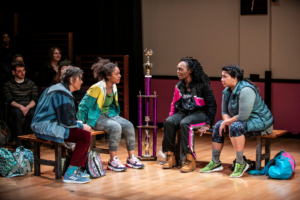
The play begins with a dark stage and the sound of feet tapping. The lights slowly come up to reveal a group of dimly lit dancers in white sailor suits, complete with embossed stars, attempting to execute an inexpert tap routine. All what you might expect from a play entitled Dance Nation, and yet something is a little off here, and it’s not just the dancer who’s suddenly fallen center stage with a gruesome leg fracture, but the size, shape, skill and age of the dancers as well. It’s about this time when you begin to realize things are not exactly what they seem, and there is way more here than just another dance dream dramedy.
The intergenerational cast, for starters, is an indication there is more here than meets the eye. Spanning roughly 50 years, the age disparity between the characters themselves and the actors portraying them is an interesting and mostly successful twist that allows for the characters to be their 13-year-old selves while also exploring how the experiences they have in the play shape them as adults. Ensemble members Caroline Neff and Karen Rodriguez, as dance tweens and besties, Zuza and Amina, are joined by Shanésia Davis and Ariana Burks as well as by Steppenwolf newcomers Adithi Chandrashekar, Ellen Maddow and Torrey Hanson, as the lone boy, Luke, in making up this motley crew of hoofers. While none of these actors are tweens themselves, each of them authentically channels their younger self, not in a “cutesy” or “saccharine” way, but, instead, by being who they are today with one eye firmly focused on those earlier experiences that have gotten them here. The cast is rounded out by Tim Hopper, as the slightly absurd and over zealous Dance Teacher Pat, and Audrey Francis, as the dancers’ moms and an oracle of sorts, portending the future for these dancers by reflecting upon and grappling with what her life/lives have become.
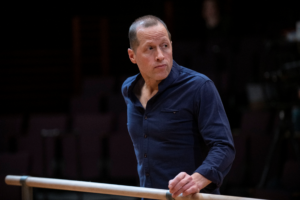 There is also the bending of time and chronology, and a story that doesn’t always progress linearly that adds to the complexity of the play, and allows us to see not just what is happening to and around the characters, but what is going on within them as well. There are fairy-tail, moon-lit dream sequences where characters discuss their hopes, wishes & dreams, that cause all of us in the audience to remember what it was like to be 13. There are also moments when the tween dancers morph into the women they will become, remembering what happened years earlier, with a clarity and understanding that true memory rarely allows, like when Maeve, perfectly portrayed by Ellen Maddow, tells us of her out of body experiences and how “one day I’ll forget that I ever used to fly…It was the coolest thing I ever did. And I forgot it.”. Most powerful are the out of time soliloquies some of the girls employ to give to voice their inner struggles, conflicts, beliefs, egotism and doubt, as when Amina, portrayed wonderfully by Karen Rodriguez, examines what it takes to be a star and why Zuzu, acted expertly by Caroline Neff, can never be one, or when Ashlee, played by Shanésia Davis, gives a one woman diatribe about her intelligence and artistry, heartbreakingly asking “ Sometimes I wonder what would happen if I really went for it.”
There is also the bending of time and chronology, and a story that doesn’t always progress linearly that adds to the complexity of the play, and allows us to see not just what is happening to and around the characters, but what is going on within them as well. There are fairy-tail, moon-lit dream sequences where characters discuss their hopes, wishes & dreams, that cause all of us in the audience to remember what it was like to be 13. There are also moments when the tween dancers morph into the women they will become, remembering what happened years earlier, with a clarity and understanding that true memory rarely allows, like when Maeve, perfectly portrayed by Ellen Maddow, tells us of her out of body experiences and how “one day I’ll forget that I ever used to fly…It was the coolest thing I ever did. And I forgot it.”. Most powerful are the out of time soliloquies some of the girls employ to give to voice their inner struggles, conflicts, beliefs, egotism and doubt, as when Amina, portrayed wonderfully by Karen Rodriguez, examines what it takes to be a star and why Zuzu, acted expertly by Caroline Neff, can never be one, or when Ashlee, played by Shanésia Davis, gives a one woman diatribe about her intelligence and artistry, heartbreakingly asking “ Sometimes I wonder what would happen if I really went for it.”
That’s not to say that there is no plot or that the story is hard to follow, it’s not. We understand from the beginning this is a team of dancers, from fictious Liverpool Indiana, on a hormone-charged mission to win the National Dance Finals in Tampa Bay. We are made very aware, mostly by Amina herself, that she is the best dancer and undoubted star of the troupe, even as she grapples mightily with her success, and that her best friend Zuzu lacks her talent. And, when Zuzu is cast as the lead dancer in a new dance choreographed by Dance Teacher Pat for a competition in Philadelphia, we are acutely aware of the friction this casting choice creates within the team.
The backstage and dressing room conversations between the dancers are both gossipy and poignantly authentic bouncing at break-neck speed between confidence and doubt, and covering such topics as life ambition, masturbation, circumcision and how to lose one’s virginity. True to teenage life, boys are rarely the topic du jour, with the girls focusing instead mostly on each other, with each at times feeling profoundly connected to or disturbingly isolated from the rest of the troupe. Underlying it all is the battle these girls are waging to figure out who they are, what they want, the difference between their passions and their talents, how to be both successful and likeable, and who they are sexually, a war we’ve all fought and carry the scars from.
There are moments of levity too, as when Dance Teacher Pat, after choosing to perform a dance called “World on Fire” based on Mahatma Gandhi (about whom the girls know next to nothing), tells the dancers as they are about to hit the stage “…to think about all the people in the world who are suffering…And I want you to go out there. And I want you to dance for them.” But mostly, Dance Nation is a blunt, sharp, spot-on examination of the sensitivities, arrogance, bold inquisitiveness and insecurities of teenage girls developing into women.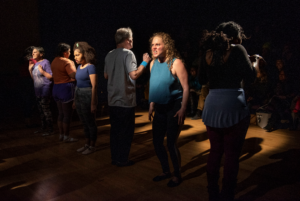
With Dance Nation Barron and Lee shine a brash and unflinching light on the weird and often dark world of what it’s like to be a teenage girl, and what we find is that it is a confused and complex, heartbreaking and hysterical, gruesome and gratifying time and space to revisit. It encouraged me to examine my own pre-teen experiences, looking at what I’ve carried with me and what my relationships with confidence, ambition and success are as a result. More than anything, Dance Nation makes one aware of just how important those years are in a young person’s life and that, from time to time, we should employ some empathy and cut them a little slack. After all, as I’ve experienced in my own life, as I’m sure you have in yours, growing up, figuring out who we are, and becoming an adult is much easier said than danced.
Dance Nation:
Running Time: 115 minutes without intermission
Showing from: December 12, 2019-February 02, 2020
For tickets: visit Steppenwolf.org or call the box office at 312-335-1650
See the theater review as well and then , if you want to see what others are saying, visit www.theatreinchicago.com, go to Review Round-Up and click at “Dance nation”.


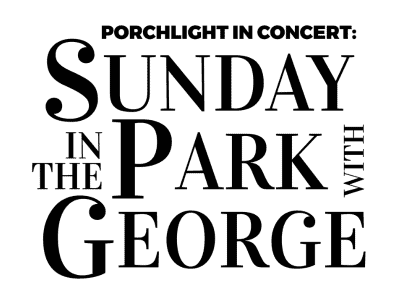
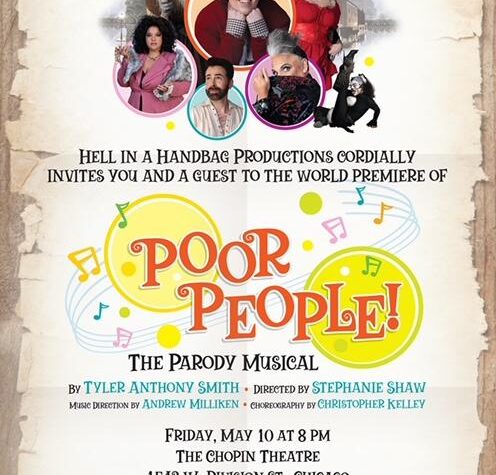
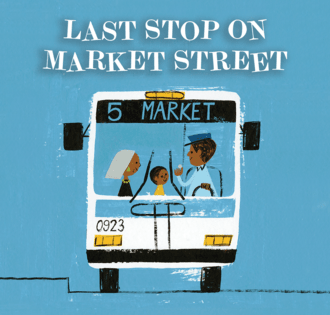

More Stories
“Poor People ! The Parody Musical” Reviewed by Julia W. Rath
“Last Stop on Market Street”
“Miz Cracker” at The Venus Cabaret